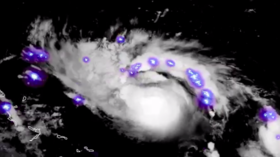Hurricane Dorian leads to gasoline crisis in Florida
Hurricane Dorian is rapidly approaching the coast of Florida, forcing people to scramble for fuel and stockpile supplies.
At the time of this writing, the storm had strengthened to a Category 3 and was on track to reach Category 4 before making landfall, likely on Monday.
Florida Governor Ron DeSantis said that there was a fuel shortage across the state as millions of people fueled up and embarked upon a long exodus up the peninsula. “We, in the emergency declaration, waived service and truck rates for fuel trucks so we can increase capacity for fuel being brought in. We're also going to be starting today implementing Florida Highway Patrol escorts for fuel trucks so we can increase fueling in critical parts of the state.” DeSantis said.
“There’s a storm premium in the WTI price,” Phil Flynn, an analyst at Price Futures Group in Chicago, told Reuters on Wednesday. “The track of the storm is kind of dangerous for Gulf of Mexico production.” More up-to-date storm modelling shows the hurricane likely set to turn up the Atlantic Coast, potentially leading to widespread damage to millions of people in coastal communities. That also means, however, that extensive oil and gas production in the Gulf of Mexico will likely be spared.
Oil prices gained on the week, pushed higher by a seemingly softer tone from President Trump regarding the US-China trade war. However, higher tariffs take effect on September 1, taking the trade war to a new, higher level. While Trump and Xi have dialed down the rhetoric, directionally, tariffs are still on an escalatory path. The hurricane also seems to have added some upward pressure on crude, analysts say.
Major hurricanes can have huge implications for energy markets. Storms that reach the Gulf of Mexico are the ones that tend to have a larger impact. Hurricane Katrina, for instance, sank oil platforms and disrupted oil production, sending crude oil and retail gasoline prices soaring in 2005. Then there was Hurricane Harvey in 2017, which devastated Houston and disrupted millions of barrels of refining capacity. That impact was different – upstream production avoided major disruptions, but the widespread damage to the Gulf Coast refining system meant that crude was trapped inland for a period of time, depressing WTI and leading to a significant disconnect with global markets. Downstream output was also curtailed for weeks.
Hurricane Dorian, on the other hand, likely won’t have nearly as much of an impact on energy markets. Florida has negligible levels of oil and gas production, and also does not have any refineries. So the disruptions will be concentrated at the local retail and consumer level.
Florida also does not have major interstate pipelines, so it “relies on petroleum products delivered by tanker and barge to Florida marine terminals, primarily at Jacksonville, Port Canaveral, Port Everglades, and Tampa,” according to the EIA. There is a pipeline system within the state, originating in Tampa and extending out to Central Florida and Orlando.
Also on rt.com Energy: The worst performing sector of the decade“In part because of Florida's large population, tourist industry, and the heavy passenger and cargo traffic through its international airports, state demand for motor gasoline and jet fuel is among the highest in the United States,” the EIA says.
Because of Florida’s unique situation – relatively distant and somewhat cut off from onshore connections, no upstream production, while also being a major consumer of refined products – sea connections for fuel are vital. And because the state’s large population is stockpiling fuel and heading north, gasoline stations are running low on fuel.
Also on rt.com The oil crisis Saudi Arabia can't solveA few days before the storm is expected to make landfall, there were widespread reports of long lines at gasoline stations and empty fuel pumps. Damage from the storm could also leave ports and fuel trucks sidelined if the recovery takes an extended period of time. Hurricane Dorian is also expected to move slowly up the state, which could exacerbate flooding as well as delay recovery. “This is potentially a multi-day event, where it will churn slowly across the state,” Gov. DeSantis said on Friday in Tallahassee. “That obviously creates a whole host of issues.”
With all of that said, these implications will likely be localized. But Hurricane Dorian is a grim reminder that the storm season still has months to go, and can deal unexpected blows.
This article was originally published on Oilprice.com













